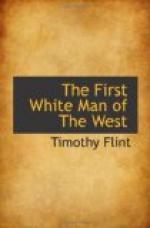Boone rejoiced in a peace which put an end to his perils and anxieties, and which now gave him full leisure and scope to follow his darling pursuit of hunting. He had first been led to the country by that spirit of the hunter, which in him amounted almost to a passion. This propensity may be said to be natural to man. Even in cities and populous places we find men so fond of this pastime that they ransack the cultivated fields and enclosures of the farmer, for the purpose of killing the little birds and squirrels, which, from their insignificance, have ventured to take up their abode with civilized man. What, then, must have been the feelings of Boone, to find himself in the grand theatre of the hunter—filled with buffaloes, deer, bears, wild turkeys, and other noble game?
The free exercise of this darling passion had been checked and restrained, ever since the first settlement of the country, by the continued wars and hostile incursions of the Indians. The path of the hunter had been ambushed by the wily savage, and he seldom ventured beyond the purlieus of his cabin, or the station where he resided. He was now free to roam in safety through the pathless wilderness—to camp out in security whenever he was overtaken by night; and to pursue the game wherever it was to be found in the greatest abundance.
Civilization had not yet driven the primitive tenants of the forest from their favorite retreats. Most of the country was still in a state of nature—unsettled and unappropriated. Few fences or inclosures impeded the free range of the hunter, and very few buts and bounds warned him of his being about to trespass upon the private property of some neighbor. Herds of buffaloes and deer still fed upon the rich cane-brake and rank vegetation of the boundless woods, and resorted to the numerous Licks for salt and drink.
Boone now improved this golden opportunity of indulging in his favorite pursuit. He loved to wander alone, with his unerring rifle upon his shoulder, through the labyrinths of the tangled forests, and to rouse the wild beast from his secret lair. There was to him a charm in these primeval solitudes which suited his peculiar temperament, and he frequently absented himself on these lonely expeditions for days together. He never was known to return without being loaded with the spoils of the chase. The choicest viands and titbits of all the forest-fed animals were constantly to be found upon his table. Not that Boone was an epicure; far from it. He would have been satisfied with a soldier’s fare. In common with other pioneers of his time, he knew what it was to live upon roots and herbs for days together. He had suffered hunger and want in all its forms without a murmur or complaint. But when peace allowed him to follow his profession of a hunter, and to exercise that tact and superiority which so much distinguished him, he selected from the abundance and profusion of the game which fell victims to his skill, such parts as were most esteemed. His friends and neighbors were also, at all times, made welcome to a share of whatever he killed. And he continued to live in this primitive simplicity—enjoying the luxury of hunting, and of roving in the woods, and indulging his generous and disinterested disposition towards his neighbors, for several years after the peace.




